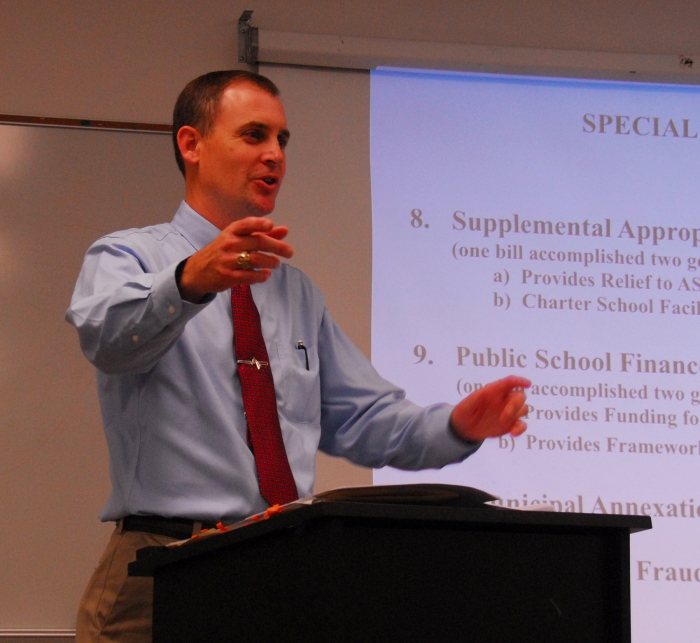Murr speaks at town hall in Kingsland

Phil Reynolds/The Highlander
State Rep. Andrew Murr, R-Junction, makes a point at a town hall-style meeting Wednesday at the Kingsland Library. Murr, who represents Llano County, reviewed actions of the recent legislative session and answered questions from a crowd of about 50.
By Phil Reynolds
The Highlander
Watch out for the guy on the other side of the aisle, but also keep an eye on your friend from the city.
That was the advice from State Rep. Andrew Murr, R-Junction, to about 50 constituents at the Kingsland Library on Wednesday, Oct. 4.
Murr, in his second term as a representative, led a lively conversation that ranged from problems with school funding to campaigning for Speaker of the House in the town hall-style meeting that ran from 4-:30 p.m.
A problem rural representatives like him face is that urban legislators far outnumber them, Murr said. He noted that of the 150 members of the Texas House of Representatives, 100 are from only 15 counties. That leaves the remaining 50 members to cover the rest of the state.
Murr himself represents 12 counties with, he said, more than 15,000 square miles, with Llano County at the far northeastern corner. The needs and wishes of those people don’t always coincide with the needs and wishes of voters in Dallas and Houston, he said.
He illustrated with a somewhat obscure point called a “rollback tax rate,” the proposed tax rate that would trigger the possibility of a taxpayer election for approval. When the Legislature convened in January, that rate was at 8 percent – a proposal of an 8 percent increase in property taxes could let voters petition for an election. Urban legislators wanted to cut that to around 5 percent and make the subsequent election mandatory, Murr said.
The solution was to tailor the legislation so it only fit counties of a certain size. But without closely tracking such proposals, Llano County could have ended up with a law that isn’t in the county’s best interests, he said.
Murr introduced a bill that would have increased sales taxes in a sweeping reform of school funding. The bill didn’t pass, but Murr said it did what he wanted it to do — get discussion started about the need to revamp how Texans pay for educating their children. He said he expects progress to be made along those lines in the future.
“I think it takes years,” he said. “It’s not something you can do overnight.”
Asked if court criticized legislative districting could affect primary elections, Murr said he thought not, because the problem districts are limited to a few.
Aside, he pointed out that the district boundaries being criticized by judges were drawn by those same courts.
Murr acknowledged that House Speaker Joe Straus, R-San Antonio, is being challenged, but noted that the House elects a speaker at the beginning of each session, and the next session isn’t until January, 2019 — more than a year away. He said the House Republican Caucus has named a committee to learn how speakers are named in other states and report back in November.
Murr also was asked if he can affect a proposal to build a rock and concrete crushing plant off US 281 south of Marble Falls. He said elected officials can’t change the process of granting a Texas Commission on Environmental Quality (TCEQ) permit, but noted that attending a hearing on the matter and making views known could be a powerful weapon.
“At those meetings, you can ask any question you want and get an answer,” he said.
The best way to combat the proposal, he said, would be to find a lawyer who specializes in such mattes, possibly forming a group to share expenses.
Marble Falls, Burnet County and more than 100 individuals have objected to the proposal based on health issues believed to affect Baylor Scott and White hospital, which is about 2-1/2 miles downwind of the project.

